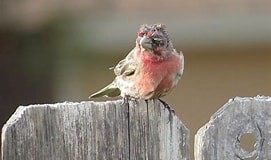This information was sent out some time ago, but since bird diseases never rest from attacking our beloved birds, it seems wise to send out a reminder. This is taken from a news email sent out by The Wildlife Rehabilitation Center in Roseville, MN, where I used to volunteer.
“Just like people, birds share bacteria as they come in contact with one another and share a meal. Mycoplasma gallisepticum can cause nasty respiratory infections in wild birds. House Finches are the species we most commonly see with the swollen, crusty eyes that are a hallmark of conjunctivitis. Without treatment, the infection can progress to complete blindness causing death. Emergency medical care can save these birds.”
If you see a downed bird that’s unable to fly, particularly if it has swollen, crusty eyes, please catch it in a towel or net, place it in a box with a lid with air holes, or a small pet carrier, and contact NW Wildlife at (360) 966-8845 to let them know about the bird and get instructions on bringing it in. You may contact Jennifer Plombon at (612) 518-2356 if you need assistance with catching and/or delivering the bird and I’ll try to help. I’ll never forget the first time I rescued a finch with conjunctivitis, may years ago. Huddled under a bush, unable to see or fly, he was utterly terrified, poor little thing. After a course of treatment with Tylosin, he recovered and was released.
You can keep all your birds healthy by washing your bird feeders with a solution of 1 part bleach to 10 parts water. This is especially important in the winter when condensation can build up in the feeder. Be sure the feeder is completely dry before refilling with seed.”

